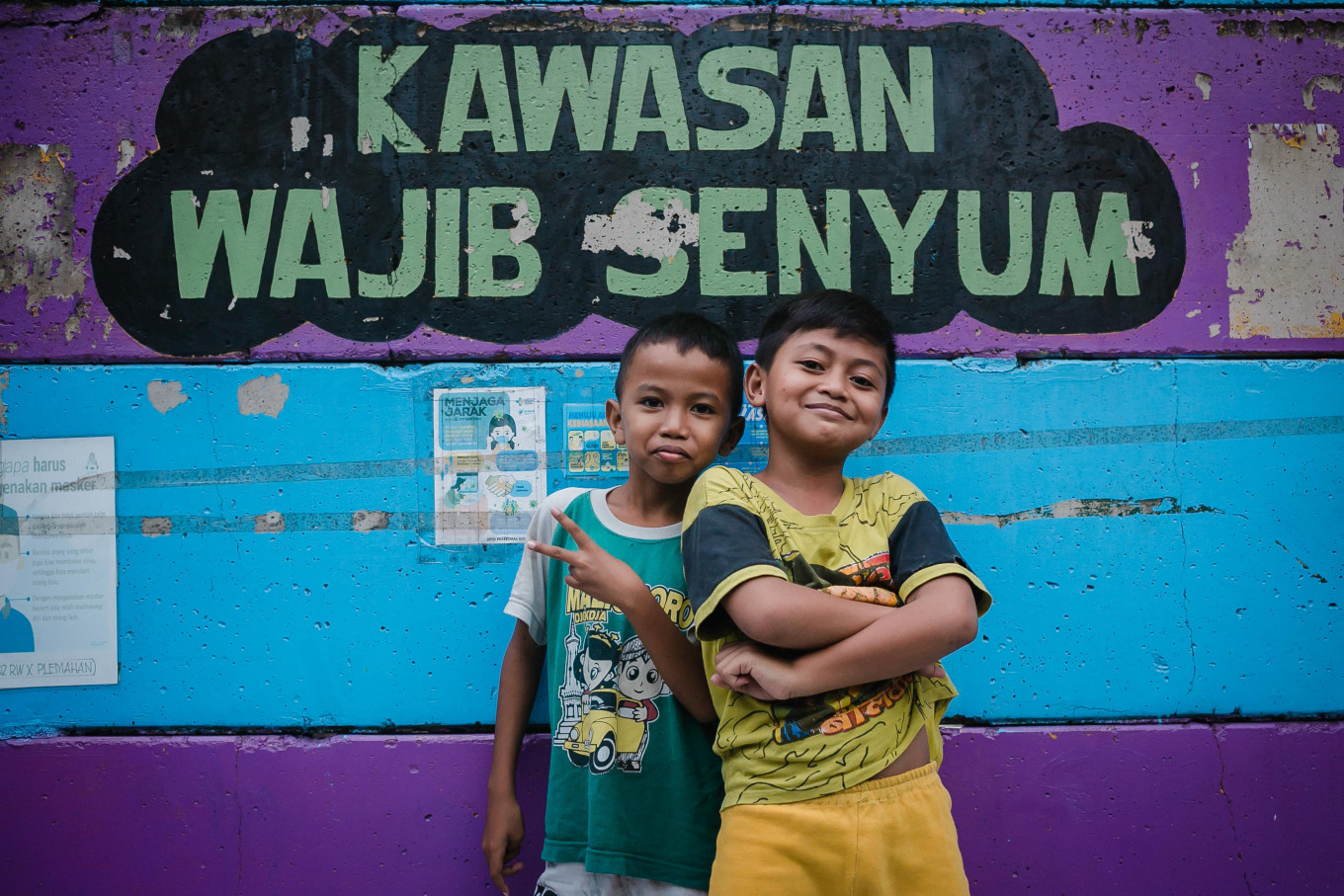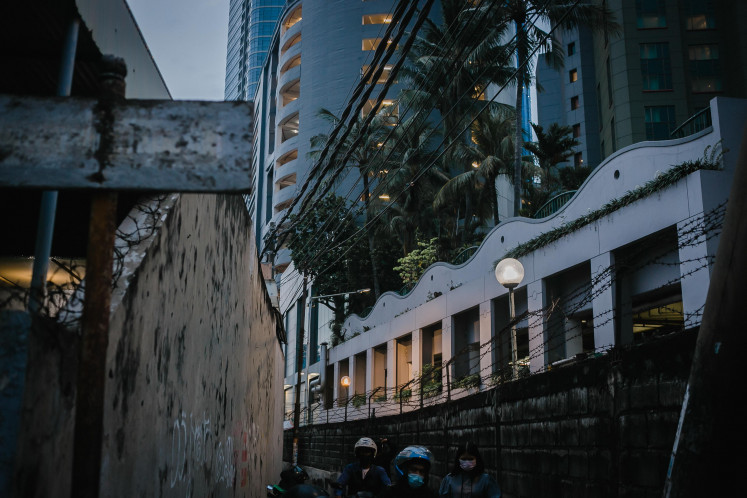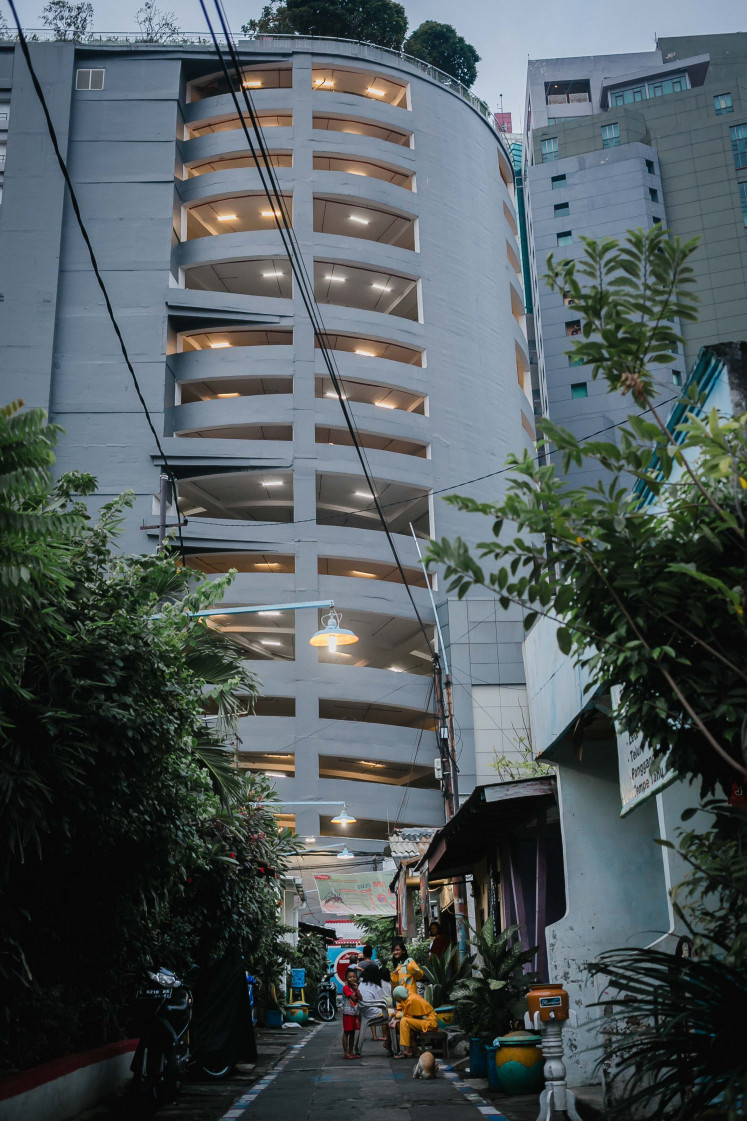Popular Reads
Top Results
Can't find what you're looking for?
View all search resultsPopular Reads
Top Results
Can't find what you're looking for?
View all search resultsLiving between megamalls: Lives of the unseen
Indonesia's endless hunger for megalopolises is shrinking the living areas of the less fortunate.
Change text size
Gift Premium Articles
to Anyone
T
he hours crept slowly towards 10 p.m. A man named Hamzah sat on the seat of a parked motorcycle, smoking a rolled cigarette that hung from his mouth. He gazed towards the glittering lights of the skyscrapers in his view. He kept glancing toward his watch and took a deep breath.
Hamzah has lived all his life in an urban kampung in Surabaya known as Pelemahan. He lives in a house he inherited from his mother located just behind a supermall called Tunjungan Plaza Surabaya. The mall, which at night is shrouded in the sheen of its luxurious lights, has expanded plenty since it was established in 1985, like many other shopping centers in the country. Proving that, for Indonesians, there can never be enough shopping areas, the mall has expanded into six different units, which are connected to each other and are called Tunjungan Plaza 1, 2 and so forth. The development, which seems to go on perpetually, has raised the living costs of residents nearby as the area becomes more luxury-oriented. This has prompted the residents to leave gradually. The once boisterous neighborhood is now quiet.
“Time passes so slowly while we are waiting. But when it comes to development, why does it feel so fast, right? Hamzah asked. “In the past, there was only one mall, only one building. And in the blink of an eye, there are now six buildings. Sometimes, when you think about it, it doesn't make sense. But that's the reality."
Hamzah makes his living as a parking attendant. Like many who own land near big buildings, he turned his residence into a motorcycle parking lot. He made the change two decades ago.
Barbed wire has been installed by the mall's management, theoretically to prevent people from the village from scaling the walls. (JP/Ivan Darski)Every day, Hamzah has some two hundred motorbikes parked at his house. He said he could earn up to Rp 15 million. This is one of the reasons Hamzah has stayed in the area. He also did not wish to experience the same fate as his neighbors who left the neighborhood only to run out of capital after failing to manage the money they received from the shopping center’s management.
Pelemahan was once a densely populated kampung with dozens of houses and hundreds of residents. Today, only five houses survive. Others chose to leave and sell their land to the mall's management.
“Because the money was barely enough, they ended up living on the outskirts of the city,” said Hamzah, although he doesn’t recall exactly how much compensation was offered. He does know that four neighbors' homes located next to each other were sold for Rp 4 billion each.
“Some have failed to manage the money and are now confused about where to live. I'm afraid of experiencing the same thing," said Hamzah.
Standing on about fifteen hectares of land, Tunjungan Plaza is one of Surabaya’s most popular shopping centers.
“Sometimes I feel sorry for the little kids who live around here. Their living space has gotten so constricted. They can't play as other children do. In my past, we could play soccer. Now, the alley is too narrow even for a bicycle. Thank God there are smartphones; they can feel happy just by playing games," said Hamzah.
Noise, flooding and less sunshine
While residents like Hamzah have found some positive aspects of the neighborhood’s changes, for those who live in huddles in a tenement, development is a disaster. Such is the story of Kacong, a Gojek driver who lives in the area with his family.
Kacong lives in the same neighborhood as Hamzah, but his home is far smaller and positioned on land that is lower than the mall. When it rains, the area often floods.
Jl. Pelemahan II, which measures 2 meters wide, is only wide enough for one motorbike to pass through. (JP/Ivan Darski)“Water flows from the mall to the residents' homes. No matter how hard we try to prevent it, we will still be flooded. In the dry season, we are safe. If it rains like this, things get really tough,” Kacong said.
Then there are the environmental and psychological disturbances caused by development. During the mall’s construction, building materials sometimes collapsed, causing air pollution. Because of the tall buildings, sunlight and fresh air have become a luxury, and the children have to choose between playing in the narrow streets or closer to the mall, where there are the dangers of vehicles and strangers. Neighborhood soccer games are out of the question in the small alleys surrounded by tall barbed-wire walls set up by the mall, theoretically to prevent people from the village from scaling the walls as a "privatization" measure. The roar of machinery is also loud and constant enough to count as noise pollution. The workers work day and night.
"It has decreased quite a bit during this pandemic. But yesterday, for God’s sake, it was so noisy!" Kacong said.
Unlike Hamzah, Kacong's residence is not big enough to be turned into a motorcycle parking lot. For him, the mall has provided nothing but noise and flooding.
"I haven’t gotten anything, really. I very rarely go to the mall, despite the big discounts or whatever. There's just no money in my wallet,” Kacong said.
The kampung where Hamzah and Kacong live are the closest settlements to Tunjungan Plaza. An older neighborhood that used to be nearby has been leveled, and some sections have become part of the shopping center’s many parking lots.
The rumors are rarely good. "I’ve heard through the grapevine that construction will keep going until there are twelve units. That's why our stay here is just a matter of time. Somehow, I'm quite sure that one day I will have to leave too," said Hamzah.
Hamzah knows that no matter how hard he defends his home, if his fellow residents do not band together to survive, they will perish. He has sought to avoid selling his childhood home, while at the same time using it to earn a living, to fetch the best possible price for the land.
"I’ve just set it at around Rp 50 million per meter. Well, that's expensive enough even for them. They have tried to negotiate many times, but I still don't want to lower the price,” said Hamzah laughing.
However, if the mall agrees to accept the figure offered, Hamzah said he would be willing to leave his residence, even if it makes him sad. If, one day, his house is razed, the memory of his childhood will also be buried among its ruins.
Hamzah said he knew that one day he would have no choice but to sell. To survive alone, he said, was futile.
"If the residents don't share the same view, it's better if we give up our place. Do you want to be here alone? No one wants to be left alone. But, well, like the other residents who left first, I'm going to buy a house on the edge of town. Little people like us are meant to live on the outskirts, right?" Hamzah said with a smile.
The clock hands pointed exactly at ten o'clock. Hamzah lit a cigarette that shifted to the corner of his mouth as his gaze wandered far ahead. Groups of employees coming through the small gap in the wall separating the mall and the kampung took him out of his reverie. Many were heading towards their motorcycles parked in Hamzah’s lot.
"Now, it's time for me to work," he said.













